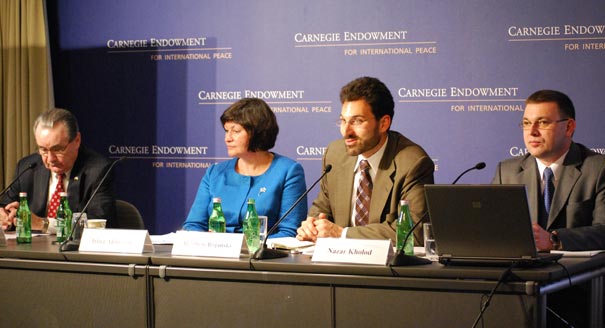{
"authors": [
"Matthew Rojansky",
"Irina Akimova",
"Nazar Kholod",
"Morgan Williams",
"Olga Shumylo-Tapiola"
],
"type": "event",
"centerAffiliationAll": "dc",
"centers": [
"Carnegie Endowment for International Peace"
],
"collections": [],
"englishNewsletterAll": "",
"nonEnglishNewsletterAll": "",
"primaryCenter": "Carnegie Endowment for International Peace",
"programAffiliation": "russia",
"programs": [
"Russia and Eurasia"
],
"projects": [],
"regions": [
"Eastern Europe",
"Ukraine"
],
"topics": [
"Political Reform",
"Democracy",
"Economy"
]
}
Can Ukraine Reform?
Wed, April 4th, 2012
Washington, D.C.
IMGXYZ3652IMGZYXPresident Yanukovych’s reform package has encountered political and practical obstacles from the outset. Proposed legislation has bogged down in the Rada, there have been protests by business owners, veterans, and workers, and critics have questioned whether the government is seriously committed to its own reform vision. Carnegie hosted First Deputy Head of the Ukrainian Presidential Administration Irina Akimova, independent scholar Nazar Kholod, U.S.-Ukraine Business Council CEO Morgan Williams, and Carnegie Europe’s Olga Shumylo-Tapiola to analyze Ukraine’s current trajectory and offer recommendations for continued economic growth and stability.
Before the panel discussion, Akimova outlined the accomplishments of the Yanukovych government over the past two years. Carnegie’s Matthew Rojansky moderated.
The Yanukovych Administration's Achievements
- Fiscal Consolidation: Ukraine’s consolidated budget deficit was 3.4 percent of GDP in 2011, compared to 11 percent in 2009, and the pace of the increase in public debt has gone down, with state debt at 36 percent of GDP, said Akimova. She added that important legislative reforms have taken place, including the addition of a new tax code, a budget code, which will aid in increasing transparency when dealing with public debt, and a customs code, which will help fight corruption in the customs office.
- Business Climate: Deregulation measures were also taken to substantially decrease the number of permits required from businesses, to reduce the number of licenses for business activities, and to adopt the automatic VAT refunds for large enterprises, said Akimova.
- Social Reforms: Ukraine undertook important steps toward pension reform, including an increase in the retirement age for women, and health care reforms, said Akimova. Agricultural reforms are also being discussed, she added.
- Democracy Principles: The Open Conversation Program, started by President Yanukovych, aims to create dialogue between the media and authorities through information requests. The government passed several new laws to aid in increasing transparency, including a law on public information, which eases restrictions on informational requests; a law on parliamentary elections; and a new public administration law. The government is also preparing to change the criminal code, said Akimova.
Economic Reforms under Yanukovych
- Tax Reform: When Yanukovych came to power in 2010, “Ukraine was the only country among all post-Soviet states without a tax code,” Kholod noted. Parliament ratified new measures to lower taxes in December 2010, but small businesses and entrepreneurs are now facing an additional tax burden.
- Pensions and Social Benefits: Although Yanukovych’s government has replaced the outdated Soviet pension model, Kholod said that the current pension system “remains unjust” because elites have retained special privileges. After Afghan war veterans and Chernobyl rescue workers participated in large street protests, the government issued a benefits package in March in anticipation of the October 2012 parliamentary elections.
- Energy Sector: Ukraine remains dependent on Russian natural gas and is “one of the least energy efficient countries in the world,” said Kholod. Russian gas prices remain high and the Ukrainian leadership needs to reform the country’s opaque energy sector.
- Business Reform: While Yanukovych’s government has simplified the registration procedure for businesses, the overall ease of doing business in Ukraine has not improved due to high levels of corruption and the lack of an independent judiciary, Kholod added.
- An Uncertain Future: Kholod asserted that the Yanukovych administration has demonstrated a lack of transparency, accountability, and “contempt for political opponents and civil society.” He stated that only five percent of Ukrainians believe that reforms have been successful. Despite the passage of new anti-corruption laws, corruption remains a “systemic and large-scale problem,” he added. Ukraine needs to improve relations with “external anchors” such as the European Union, International Monetary Fund, and World Bank, but it has clearly “ventured off course” for the time being, he concluded.
Ukraine’s Business Environment
- U.S.-Ukraine Business Council: Since its creation in 1995, the U.S.-Ukraine Business Council has grown to 175 members and is the largest council involving Ukraine that is not based on its territory, Williams noted.
- A Promising Market: Ukraine represents Europe’s “largest emerging market” with 45 million consumers and a highly educated and motivated new generation of young business professionals committed to a better future, Williams said. Large U.S. companies such as Kraft, Procter & Gamble, and Coca-Cola have invested hundreds of millions of dollars and even shifted production to Ukraine. Business levels could easily triple or quadruple over time, he argued.
- Reform Obstacles: Williams listed a number of obstacles that limit Ukraine’s economic potential, including excessive bureaucracy, weak intellectual property rights, opaque taxation practices, and an underdeveloped agricultural sector. He added that no Ukrainian administration in the past twenty years has introduced a comprehensive reform package needed to achieve a breakthrough. “Ukraine has one foot in the future and one foot in the past,” he concluded.
Ukraine’s Ailing Economy
- Absence of Political Will: The greatest challenge to Ukraine’s economic development is not a lack of transparency, but a lack of political will to reform, Shumylo-Tapiola argued. Since Yanukovych became president, reforms have been “patchy” and inconsistent and efforts to combat corruption have proven unsuccessful, she added. From Brussels’s perspective, Ukraine is becoming “more of a gray zone” with the economy divided between oligarchs and members of the president’s family.
- Ukraine and the European Union: Although details of Ukraine’s Association Agreement with the European Union were finalized at the end of March, Ukraine has been slow to embrace European values, she noted. At the moment there is a “stalemate in relations” between Kyiv and Brussels. EU officials are concerned that the ruling Party of Regions will use the upcoming parliamentary elections in October to consolidate power rather than initiate a society-wide debate on changing the constitution.
- Next Generation: Shumylo-Tapiola urged young Ukrainians to consider careers in business, arguing that few people are able to promote reform while maintaining integrity in government. More exchange programs with European and U.S. universities could provide Ukrainian youth with valuable international experience, she suggested.
A View from the Administration
- Open Dialogue: Yanukovych’s government welcomes criticism and is actively consulting businesses and civil society in policy-making, Akimova argued. She asserted that maintaining open channels of communication between state and society is integral to the success of reform efforts.
- Aspirations versus Realities: As an independent scholar it is easy to criticize the government from the outside, but ideal solutions are often difficult to implement within the system, Akimova added. For example, government officials must often confront the “vested interests” of elites when implementing legislation, she added.
- Reform Efforts: Akimova acknowledged that the Yanukovych administration has introduced reforms but has yet to fully implement them. The government has opened the door, she added, and wants to see reforms through to the end. She suggested that the electronic registration of businesses and permits could help eliminate bribery in Ukraine, as it did in Poland and Georgia.
Carnegie does not take institutional positions on public policy issues; the views represented herein are those of the author(s) and do not necessarily reflect the views of Carnegie, its staff, or its trustees.
Event Speakers
Rojansky, formerly executive director of the Partnership for a Secure America, is an expert on U.S. and Russian national security and nuclear-weapon policies.
Irina Akimova
Nazar Kholod
Morgan Williams

